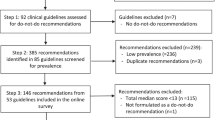Abstract
Compliance with the consultant’s recommendations is one measure of the effectiveness of a consultation. A previous study showed that compliance was better when fewer recommendations were made. In the subsequent year, consultants were encouraged to limit their recommendations to five or fewer. Despite a significant decrease in the number of recommendations, compliance rates remained essentially unchanged (72%). Multivariate analysis demonstrated that the clinical severity of the patient’s disease and the number of associated problems, as well as the types of recommendations, were significant predictors of compliance. Compliance was best for recommendations involving medications (84%) and worst for recommendations involving diagnostic tests (62%). Compliance was also evaluated in the context of a surgeon’s view of the appropriateness of the recommendations. For recommendations felt to be essential to patient care the compliance rate was 75%, but it was only 44% for recommendations judged non-essential (p<0.001). The consulting internist should be aware that the surgeon’s view of the relevance of the recommendations to patient care needs may have an important effect on compliance.
Similar content being viewed by others
References
Sears CS, Charlson ME. The effectiveness of consultation: compliance with initial recommendations. Am J Med 1983;74:870–6
Statistical analysis system. Cary, North Carolina: SAS Institute, 1980
Vandam LD. To make the patient ready for surgery, Menlo Park, California: Addison-Wesley Publishing Co., 1980
American College of Surgeons. Manual of preoperative and postoperative care, 1982
Lubin MF, Walker K, Smith RB. Medical management of the surgical patient. Woburn, Massachusetts, Butterworths Publishers, 1982
Goldman DR, Brown FH, Levy WK, Slap GB, Sussman EJ. Medical care of the surgical patient. Philadelphia: J. B. Lippincott, 1982
Molitch ME. Management of medical problems in surgical patients. Philadelphia: F. A. Davis, 1982
Stevens AJ, Preparation for anesthesia. Baltimore: University Park Press, 1980.
Lee T, Pappius EM, Goldman L. Impact of inter physician communication and the effectiveness of medical consultation. Am J Med 1983;74:106–112
Horwitz RI, Henes CG, Horwitz SM. Developing strategies for improving diagnostic and management efficacy of medical consultations. J Chron Dis 1983;36:213–8
Author information
Authors and Affiliations
Additional information
Received from the Departments of Medicine and Surgery, Cornell University Medical College, New York, New York. Dr. Ballard was a Henry J. Kaiser Foundation Fellow in General Internal Medicine. Dr. Gold is a Fellow in Cardio-Thoracic Surgery, Brigham and Women’s Hospital, Harvard Medical School, Boston, Massachusetts. Dr. Charlson is a Henry J. Kaiser Family Foundation Faculty Scholar in General Internal Medicine.
Rights and permissions
About this article
Cite this article
Ballard, W.P., Gold, J.P. & Charlson, M.E. Compliance with the recommendations of medical consultants. J Gen Intern Med 1, 220–224 (1986). https://doi.org/10.1007/BF02596186
Issue Date:
DOI: https://doi.org/10.1007/BF02596186




